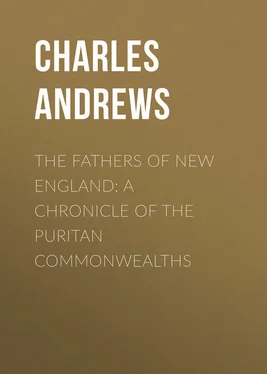Charles Andrews - The Fathers of New England - A Chronicle of the Puritan Commonwealths
Здесь есть возможность читать онлайн «Charles Andrews - The Fathers of New England - A Chronicle of the Puritan Commonwealths» — ознакомительный отрывок электронной книги совершенно бесплатно, а после прочтения отрывка купить полную версию. В некоторых случаях можно слушать аудио, скачать через торрент в формате fb2 и присутствует краткое содержание. Жанр: foreign_antique, foreign_prose, Историческая проза, на английском языке. Описание произведения, (предисловие) а так же отзывы посетителей доступны на портале библиотеки ЛибКат.
- Название:The Fathers of New England: A Chronicle of the Puritan Commonwealths
- Автор:
- Жанр:
- Год:неизвестен
- ISBN:нет данных
- Рейтинг книги:3 / 5. Голосов: 1
-
Избранное:Добавить в избранное
- Отзывы:
-
Ваша оценка:
- 60
- 1
- 2
- 3
- 4
- 5
The Fathers of New England: A Chronicle of the Puritan Commonwealths: краткое содержание, описание и аннотация
Предлагаем к чтению аннотацию, описание, краткое содержание или предисловие (зависит от того, что написал сам автор книги «The Fathers of New England: A Chronicle of the Puritan Commonwealths»). Если вы не нашли необходимую информацию о книге — напишите в комментариях, мы постараемся отыскать её.
The Fathers of New England: A Chronicle of the Puritan Commonwealths — читать онлайн ознакомительный отрывок
Ниже представлен текст книги, разбитый по страницам. Система сохранения места последней прочитанной страницы, позволяет с удобством читать онлайн бесплатно книгу «The Fathers of New England: A Chronicle of the Puritan Commonwealths», без необходимости каждый раз заново искать на чём Вы остановились. Поставьте закладку, и сможете в любой момент перейти на страницу, на которой закончили чтение.
Интервал:
Закладка:
The experience that was had in this commone course and condition, tried sundrie years, and that amongst godly and sober men, may well evince the vanitie of that conceite of Platos and other ancients, applauded by some of later times; that the taking away of propertie, and bringing in communitie into a comone wealth, would make them happy and florishing; as if they were wiser then God. For this comunitie (so farr as it was) was found to breed much confusion and discontent, and retard much imployment that would have been to their benefite and comforte. For the yong-men that were most able and fitte for labour and service did repine that they should spend their time and streingth to worke for other mens wives and children, with out any recompence. The strong, or man of parts, had no more in devission of victails and cloaths, than he that was weake and not able to doe a quarter the other could; this was thought injuestice. The aged and graver men to be ranked and equalised in labours, and victails, cloaths, etc., with the meaner and yonger sorte, thought it some indignitie and disrespect unto them. And for mens wives to be commanded to doe servise for other men, as dresing their meate, washing their cloaths, etc., they deemd it a kind of slaverie, neither could many husbands well brooke it.
During the two years that followed, so evident was the failure of the joint undertaking that efforts were made on both sides to bring it to an end; for the merchants, with no profit from the enterprise, were anxious to avoid further indebtedness; and the colonists, wearying of the dual control, wished to reap for themselves the full reward of their own efforts. Under the new arrangement of small private properties, the settlers began "to prise corne as more pretious than silver, and those that had some to spare begane to trade one with another for small things, by the quart, pottle, and peck, etc., for money they had none." Later, finding "their corne, what they could spare from ther necessities, to be a commoditie, (for they sould it at 6s. a bushell) [they] used great dilligence in planting the same. And the Gov[erno]r and shuch as were designed to manage the trade, (for it was retained for the generall good, and none were to trade in particuler,) they followed it to the best advantage they could; and wanting trading goods, they understoode that a plantation which was at Monhigen, and belonged to some marchants of Plimoth [England] was to breake up, and diverse usefull goods was ther to be sould," the governor (Bradford himself) and Edward Winslow "tooke a boat and some hands and went thither… With these goods, and their corne after harvest they gott good store of trade, so as they were enabled to pay their ingagements against the time, and to get some cloathing for the people, and had some comodities beforehand." Though conditions were hard and often discouraging, the Pilgrims gradually found themselves self-supporting and as soon as this fact became clear, they sent Isaac Allerton to England "to make a composition with the adventurers." As a result of the negotiations an "agreement or bargen" was made whereby eight leading members of the colony bought the shares of the merchants for £1800 and distributed the payment among the settlers, who at this time numbered altogether about three hundred. Each share carried with it a certain portion of land and livestock. The debt was not finally liquidated until 1642.
By 1630, the Plymouth colony was fairly on its feet and beginning to grow in "outward estate." The settlers increased in number, prospered financially, and scattered to the outlying districts; and Plymouth the town and Plymouth the colony ceased to be identical. Before 1640, the latter had become a cluster of ten towns, each a covenanted community with its church and elder. Though the colony never obtained a charter of incorporation from the Crown, it developed a form of government arising naturally from its own needs. By 1633 its governor and one assistant had become a governor and seven assistants, elected annually at a primary assembly held in Plymouth town; and the three parts, governor, assistants, and assembly, together constituted the governing body of the colony. In 1636, a revision of the laws and ordinances was made in the form of "The Great Fundamentals," a sort of constitution, frequently interspersed with statements of principles, which was printed with additions in 1671. The right to vote was limited at first to those who were members of the company and liable for its debt, but later the suffrage was extended to include others than the first-comers, and in 1633 was exercised by sixty-eight persons altogether. In 1668, a voter was required to have property, to be "of sober and peaceable conversation," and to take an oath of fidelity, but apparently he was never required to take the oath of allegiance to the Crown. So rapidly did the colony expand that, by 1639, the holding of a primary assembly in Plymouth town became so inconvenient that delegates had to be chosen. Thus there was introduced into the colony a form of representative government, though it is to be noted that governor, assistants, and deputies sat together in a common room and never divided into two houses, as did the assemblies in other colonies.
The settlement of Plymouth colony is conspicuous in New England history because of the faith and courage and suffering of those who engaged in it and because of the ever alluring charm of William Bradford's History of Plimouth Plantation . The greatness of the Pilgrims lay in their illustrious example and in the influence they exercised upon the church life of the later New England colonies, for to the Pilgrims was due the fact that the congregational way of organization and worship became the accepted form in Massachusetts and Connecticut. But in other respects Plymouth was vastly overshadowed by her vigorous neighbors. Her people, humble and simple, were without importance in the world of thought, literature, or education. Their intellectual and material poverty, lack of business enterprise, unfavorable situation, and defenseless position in the eyes of the law rendered them almost a negative factor in the later life of New England. No great movement can be traced to their initiation, no great leader to birth within their borders, and no great work of art, literature, or scholarship to those who belonged to this unpretending company. The Pilgrim Fathers stand rather as an emblem of virtue than a moulding force in the life of the nation.
CHAPTER II
THE BAY COLONY
While the Pilgrims were thus establishing themselves as the first occupants of the soil of New England, other men of various sorts and motives were trying their fortunes within its borders and were testing the opportunities which it offered for fishing and trade with the Indians. They came as individuals and companies, men of wandering disposition, romantic characters many of them, resembling the rovers and adventurers in the Caribbean or representing some of the many activities prevalent in England at the beginning of the seventeenth century. Thomas Weston, former ally of the Pilgrims, settled with a motley crew of rude fellows at Wessagusset (Quincy) and there established a trading post in 1622. Of this settlement, which came to an untimely end after causing the Pilgrims a great deal of trouble, only a blockhouse and stockade remained. Another irregular trader, Captain Wollaston, with some thirty or forty people, chiefly servants, established himself in 1625 two miles north of Wessagusset, calling the place Mount Wollaston. With him came that wit, versifier, and prince of roysterers, Thomas Morton, who, after Wollaston had moved on to Virginia, became "lord of misrule." Dubbing his seat Merrymount, drinking, carousing, and corrupting the Indians, affronting the decorous Separatists at Plymouth, Morton later became a serious menace to the peace of Massachusetts Bay. The Pilgrims felt that the coming of such adventurers and scoffers, who were none too scrupulous in their dealings with either white man or Indian and were given to practices which the Puritans heartily abhorred, was a calamity showing that even in the wilds of America they could not escape the world from which they were anxious to withdraw.
Читать дальшеИнтервал:
Закладка:
Похожие книги на «The Fathers of New England: A Chronicle of the Puritan Commonwealths»
Представляем Вашему вниманию похожие книги на «The Fathers of New England: A Chronicle of the Puritan Commonwealths» списком для выбора. Мы отобрали схожую по названию и смыслу литературу в надежде предоставить читателям больше вариантов отыскать новые, интересные, ещё непрочитанные произведения.
Обсуждение, отзывы о книге «The Fathers of New England: A Chronicle of the Puritan Commonwealths» и просто собственные мнения читателей. Оставьте ваши комментарии, напишите, что Вы думаете о произведении, его смысле или главных героях. Укажите что конкретно понравилось, а что нет, и почему Вы так считаете.












